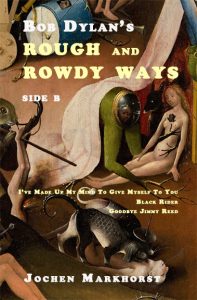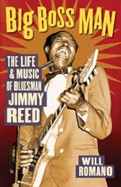 “So much beauty, so little time,” my grandmother used to sigh, standing in front of her record cabinet. And mind you, she only had one single Dylan record (Greatest Hits) – Rough And Rowdy Ways she did not live to hear.
“So much beauty, so little time,” my grandmother used to sigh, standing in front of her record cabinet. And mind you, she only had one single Dylan record (Greatest Hits) – Rough And Rowdy Ways she did not live to hear.
“Key West”, “My Own Version of You”, “Murder Most Foul”… the songs of Rough And Rowdy Ways are bulging treasure troves. A book on the album would become an even thicker paving stone than Mixing Up The Medicine, so I chose to just chop it up into manageable chunks. Following I Contain Multitudes and Crossing The Rubicon is now published: Rough And Rowdy Ways – Side B. About the three songs on Side B; “I’ve Made Up My Mind To Give Myself To You”, “Black Rider” and “Goodbye Jimmy Reed”. It’s an album that just keeps on giving.
Goodbye Jimmy Reed (2020) part 7
by Jochen Markhorst
VII You can see the light
You won’t amount to much the people all said ‘Cause I didn’t play guitar behind my head Never pandered never acted proud Never took off my shoes and threw them into the crowd Goodbye Jimmy Reed - goodbye and goodnight I’ll put a jewel in your crown - I’ll put out the light
 We saw something like this in “Idiot Wind” too. A novella-like opening about a man who is accused of murdering one Gray. He leaves for Italy with Gray’s widow and, after her death, inherits a fortune – all in the first verse. Whereupon, in the second verse, the song leaves both the man and Italy, never to return there. A deliberate diversion, Dylan explains ten years later (1985), when Bill Flanagan interviews him for his book Written In My Soul. To prevent “Idiot Wind” from being perceived as too personal:
We saw something like this in “Idiot Wind” too. A novella-like opening about a man who is accused of murdering one Gray. He leaves for Italy with Gray’s widow and, after her death, inherits a fortune – all in the first verse. Whereupon, in the second verse, the song leaves both the man and Italy, never to return there. A deliberate diversion, Dylan explains ten years later (1985), when Bill Flanagan interviews him for his book Written In My Soul. To prevent “Idiot Wind” from being perceived as too personal:
“With that particular set-up in the front I thought I could say anything after that. If it did seem personal I probably made it overly so – because I said too much in the front and still made it come out like, “Well, so what?” I didn’t really think it was too personal.”
Or in “Highlands” (1997), where the flow of the lyrics is interrupted by the “Boston interlude”, an isolated narrative about a first-person in an empty Boston establishment and his interaction with the only other person present, a waitress. Seven narrative stanzas long, after which the lyrics return to the original lyrical articulation of longing for the Scottish Highlands – unrelated to that alienating interlude.
This third verse of “Goodbye Jimmy Reed” seems to do something similar. At least: the narrator of this third verse and the subsequent fourth verse is a musician, a narrator who plays guitar as well as sings – they are the only verses (of the six) that could be inspired by Jimmy Reed’s biography. More than the preceding and following ones, anyway; Jimmy Reed, as far as we know, never lived on a street named after a Saint, and neither his biography nor his discography offer any clues to justify all those religious references.
Mathis James “Jimmy” Reed was born 6 September 1925 at the Shady Dell plantation in Dunleith, Washington County, Mississippi, located on Collier Road. A memorial sign stands there today, as part of the Mississippi Blues Trail. And Christian or otherwise religious traces are hardly to be found in his work. Well alright, I go to church in the morning, baby in “Down In Mississippi” at most – but that’s chosen mainly for the tragicomic effect Reed wants to score in the lines that follow:
I go to church in the morning, baby, you know,
down the railroad track
Late over in the evening they bring, bring the preacher back
He eat up all the chicken now but uh right to the neck
Look over at my baby and he eat up all the rest
'cause he was uh down in Mississippi
Still, a fictional address and made-up godliness are not really arguments in themselves to argue that the first two verses would not be about Jimmy Reed, of course. After all, Dylan generally cares little for historical accuracy. “John Wesley Harding”, “Joey”, “Blind Willie McTell”… the reverse is rather the case; whenever the songwriter Dylan brings up historical figures, he does fantasise some biography to go with it.
However: in those other songs, the historical protagonists usually remain recognisable, and that is certainly not the case here. No, if we can compare “Goodbye Jimmy Reed” with any song from Dylan’s oeuvre at all, it is mainly with “Highlands”; like the “Boston interlude” in that song, this third and fourth stanzas seem like an unrelated “bluesman interlude”.
Word choice is unspecified enough to also see a Jimmy Reed in it – after all, the personal information solely describes what the protagonist is not. And really only eliminates candidates, if we take the text seriously. Van Morrison and Mick Jagger did perform barefoot, took off their shoes, for example, and Jimi Hendrix and Charley Patton did play guitar behind their heads, so they also drop out. The stage presence of both Muddy Waters and Bo Diddley consisted mainly of acting proud, and pandering is something just about the entire blues pantheon plus the tiers below, from B.B. King to Eric Clapton and from Taj Mahal to Freddie King, have been guilty of, to varying degrees.
No, we probably shouldn’t scrutinise the content of this verse to check for data corresponding with Reed’s biography. Or anyone’s, for that matter. Dylan the song poet is in The Zone, freely associating to present a fictional life history of a faceless bluesman, and is presumably digging around in his inner jukebox for vocabulary. Where, from the looks of it, he finds “Settin’ The Woods On Fire”, for instance, one of Hank Williams’ last singles (released September 1952, some three months before his death), with the classic “You Win Again” as its B-side. The song reaches the second spot on the Country Charts, and already in the opening words we hear a “Goodbye Jimmy Reed” echo:
Comb your hair and paint and powder You act proud and I'll act prouder You sing loud and I'll sing louder Tonight we're settin' the woods on fire
… the powder and paint from the first verse. Not necessarily Dylan’s direct inspiration, but that those words lead his stream-of-consciousness to Hank’s hit and subsequently to acting proud seems an educated guess, to say the least.
Similar, equally unimportant lines from “Goodbye Jimmy Reed” to Dylan’s inner jukebox can be drawn from every line of verse. Already The Kingston Trio’s “Desert Pete” (1963) took off his shoes, Dylan’s one-time bandmate Roy Orbison already sang I know they don’t think that I’ll amount to much (“Big As I Can Dream”, 1965), also as opening words, and who knows, maybe Jimmy’s birthplace led Dylan’s flow to Phil Ochs’ “Here’s To The State Of Mississippi”, where the Sunday morning sermons pander to their lust, yielding the religious sub-motif en passant. Although it is more appealing to think that Dylan internalised that unusual “pander” while singing along with Toots & The Maytals’ 1969 “Sweet And Dandy”, with its irresistible chorus:
It is no wonder It's a perfect pander While they were dancing in that bar room last night
… from the eponymous LP Sweet And Dandy, the LP with classics like “Pressure Drop”, “54-46 Was My Number” and especially “Monkey Man”.
The only true, actual biographical fact then is the self-fulfilling prophecy of the closing line; when the world’s greatest songwriter storms the charts and concert stages in 2020 with Rough And Rowdy Ways and “Goodbye Jimmy Reed”, he is indeed putting a jewel in the crown, bringing out Jimmy’s light.
“You feel like you can see the light hitting the dust,” Dylan writes in The Philosophy Of Modern Song re the sound of Jimmy Reed’s Vee-Jay records, “as it swirls under the sway of music.”
————————–
To be continued. Next up Goodbye Jimmy Reed part 8: What’s in my own head and what’s in my own heart
Jochen is a regular reviewer of Dylan’s work on Untold. His books, in English, Dutch and German, are available via Amazon both in paperback and on Kindle:
- Blood on the Tracks: Dylan’s Masterpiece in Blue
- Blonde On Blonde: Bob Dylan’s mercurial masterpiece
- Where Are You Tonight? Bob Dylan’s hushed-up classic from 1978
- Desolation Row: Bob Dylan’s poetic letter from 1965
- Basement Tapes: Bob Dylan’s Summer of 1967
- Mississippi: Bob Dylan’s midlife masterpiece
- Bob Dylan’s Greatest Hits
- John Wesley Harding: Bob Dylan meets Kafka in Nashville
- Tombstone Blues b/w Jet Pilot: Dylan’s lookin’ for the fuse
- Street-Legal: Bob Dylan’s unpolished gem from 1978
- Bringing It All Back Home: Bob Dylan’s 2nd Big Bang
- Time Out Of Mind: The Rising of an Old Master
- Crossing The Rubicon: Dylan’s latter-day classic
- Nashville Skyline: Bob Dylan’s other type of music
- Nick Drake’s River Man: A very British Masterpiece
- I contain Multitudes: Bob Dylan’s Account of the Long Strange Trip
- Bob Dylan’s Rough And Rowdy Ways – Side B
